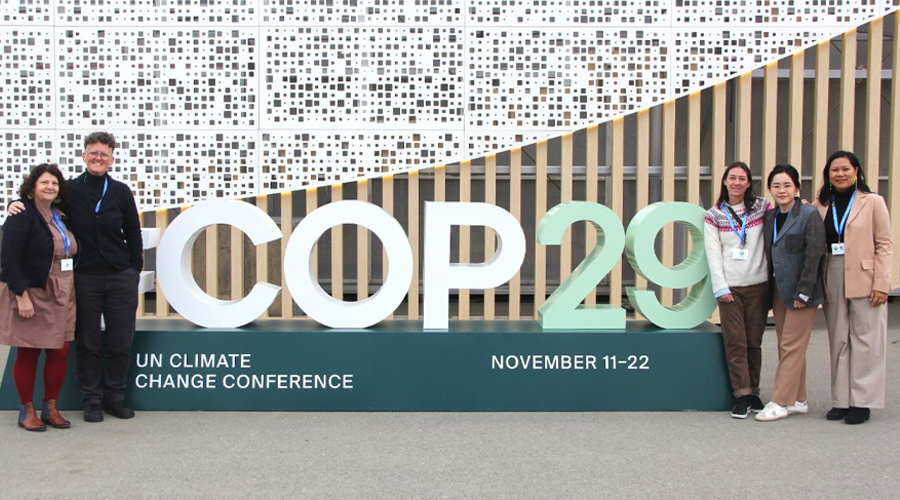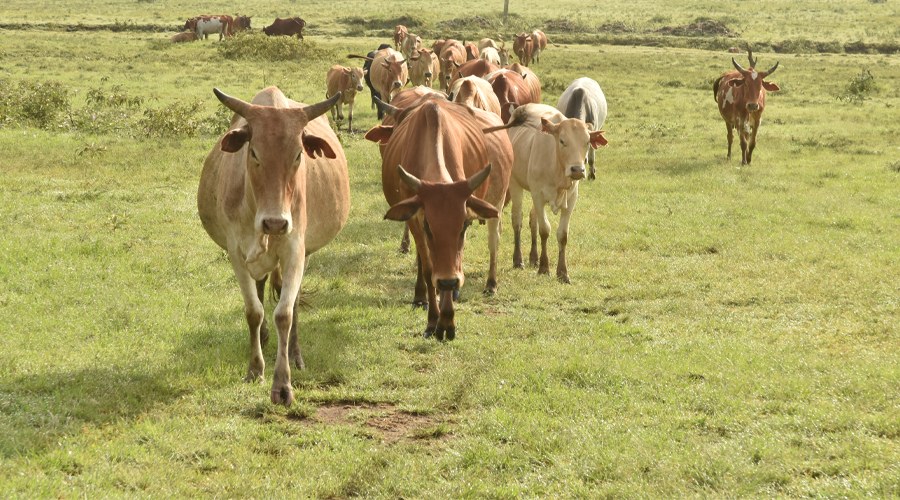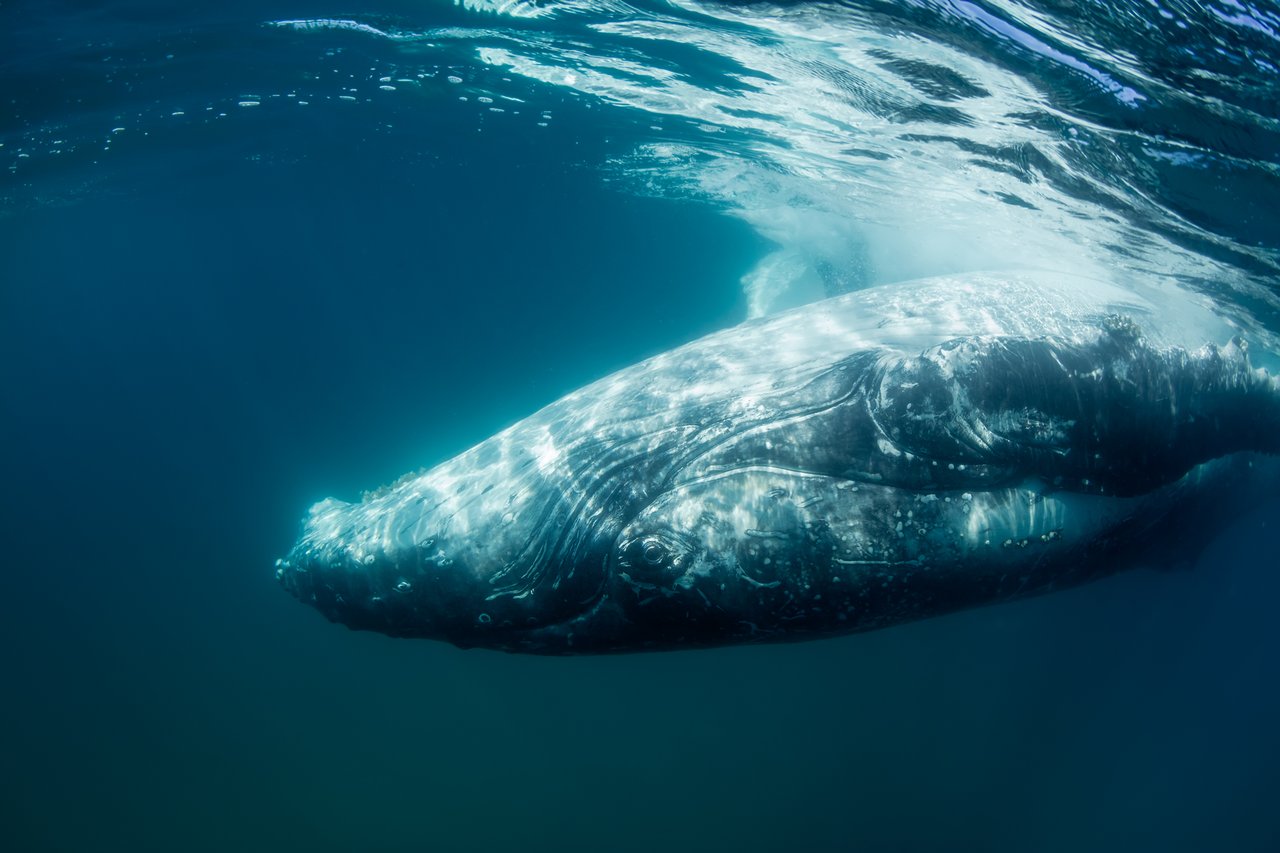
Global Review 2024
Our vision: A world where animals live free from cruelty and suffering.
Our mission: We move the world to protect animals.
During our ambitious 10-year strategy (2021–2030):
We will…
Ensure that farmed animals live good lives by transforming the global food system.
Stop wild animals from being cruelly exploited as commodities by changing the systems that allow it.
In 2024, across our 12 offices and International office, with a reach of over 47 countries, we challenged some of the biggest drivers of animal cruelty, from confronting factory farming at the UN to holding corporate giants like JBS, the world’s largest meat producer, and TUI, a leading travel company, to account.
This would not have been possible without the generosity of an incredible group of people – you – our supporters. We deeply appreciate your motivation and loyalty. Your support, messages, letters and phone calls are so uplifting. One supporter thanked us recently for being their “hope in the world”. This is an amazing tribute and one we strive to live up to every day.
Thank you so much for being our hope in the world too.
Tricia Croasdell, CEO
Sarah Ireland, Chair
Moving the world in numbers

Around 5.5 billion wild animals live in cruel conditions on commercial wildlife farms as revealed in our shocking report Bred for profit: The truth about global wildlife farming, which featured in over 300 media articles.
Our work at COP29 featured in over 50 media articles and reached over 181 million people.
Our New Era Conversationist film made with Kenya's GreenTalkArt, telling the powerful story of a baby elephant and his poet rescuer, was seen over 1.8 million times.
Over 350,000 people across 9 countries signed a petition urging TUI Group to stop profiting from cruel cetacean entertainment.
Over 172,000 supporters from 26 countries called for an end to commercial captive elephant breeding in Thailand.
Over 25,000 people joined us in asking Rabobank – the Netherlands' second biggest bank – to stop funding factory farming after we exposed their greenwashing.
Over 1,000 slower growing chicks were put on 11 high– welfare farms in Thailand through our Farm Champion Project with Suranaree University of Technology.
By the end of 2024, 191 bears rescued from cruel activities were getting the best care at sanctuaries we support in Pakistan and Romania.
We moved 20 Nigerian civil society organisations to oppose an MOU between the Nigerian government and JBS, a vital step in preventing a massive factory farming roll-out.
Two severely burned tapirs in Brazil received expert care, treatment and rehabilitation by our partners, Onçafari.
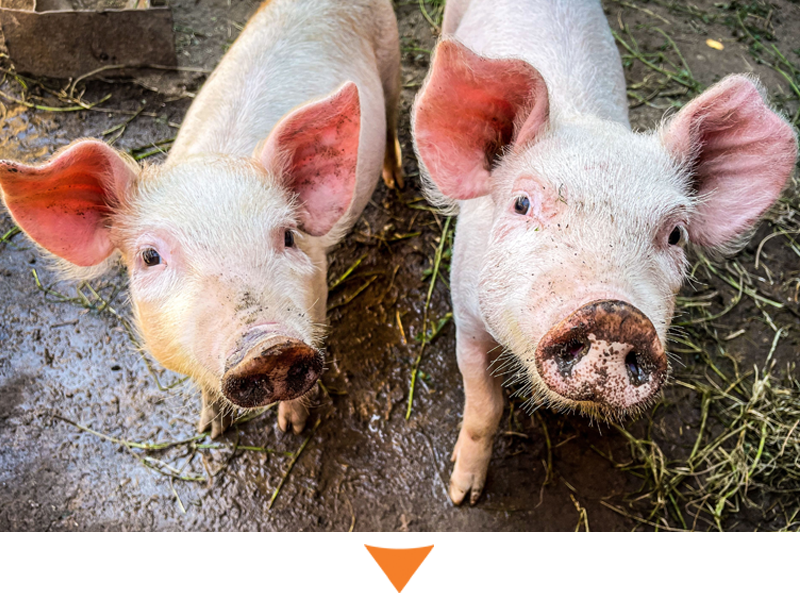
Transforming the broken food system
Factory farming is the biggest cause of animal cruelty in the world. Eighty billion animals are farmed, transported and slaughtered in a broken industrial global food system driven by convenience and price.
We are working to end the cruelty of factory farming and helping create an equitable, humane and sustainable food system. With your help, we can ensure every farmed animal lives a good life.

Delaying Destruction: Dropping JBS
JBS, the world’s largest meat processing company, embodies the worst practices of factory farming. Behind every meal linked to the company lies a trail of animal suffering and the shameless destruction of vital habitats such as the Amazon and Cerrado, cleared to make way for soy and grain to feed these animals, and to graze livestock.
In 2022, we joined the Drop JBS Coalition, a powerful alliance of campaign groups, lawyers and policy makers, to expose the company's greenwashing and halt its ambitions for growth. Together, we successfully pushed back JBS's attempt to list on the New York Stock Exchange – blocking their access to major sources of new funding for almost two years. This was a major win against this destructive, climate-wrecking company.
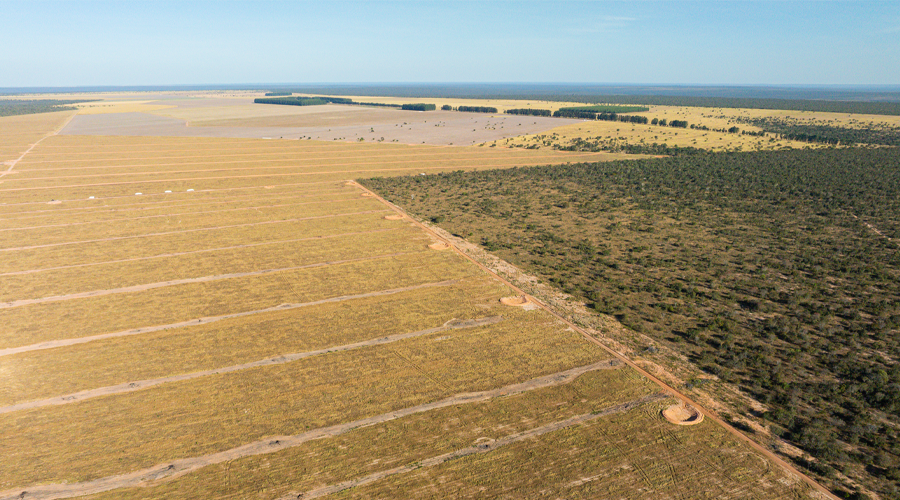
Our work to delay this listing included:
Submitting reports to credit rating agencies and the U.S. Securities and Exchange Commission, which regulates the admission to the stock exchange. These reports exposed the truth about how their supply chains drive deforestation and habitat loss.
Alerting the Science-Based Targets Initiative (SBTi) to the risk of validating JBS's net-zero claims, which later were removed from their website, reinforcing their reputation as a major global polluter and undermining their bid for the listing.
Highlighting the global issues around factory farming at the UN's climate negotiations (SB60), where we helped block the use of greenwashing language – like "sustainable intensification" – from draft texts. These phrases have been used by companies like JBS to justify factory farming.
Over the years we have compiled evidence against JBS. Our evidence shows the link between JBS’ activities, produce and profit, with deforestation, illegal farming and the exploitation of traditional communities. To date, JBS has refused to change their practices in response to the evidence of destruction and harm we have presented to them.
We sent a joint letter to the Science Based Targets initiative, proving that JBS falsely declared zero deforestation in the latest CDP forest disclosure and called on them to remove JBS from its net zero commitment dashboard.
Other highlights included:
Meeting with JBS's chief sustainability officer to discuss their latest deforestation policies which revealed fresh insights into their expansion plans. We'll use this crucial information to sharpen our future campaign.
Revealing the connection between beef sold in Dutch supermarkets and deforestation caused by JBS's supply chain in our report Deforestation Meat on Your Plate, which sparked public responses from supermarkets Albert Heijn and Lidl, reinforcing their pledges to source deforestation-free beef.
Amplifying the call for urgent food system reform through workshops and presentations on the harms of industrial agriculture at prestigious conferences such as the 8th World One Health Congress and UN's SB60 climate negotiations.
Uncovering the brutal toll of factory farming through our joint investigations with We Animals Media in Brazil, which laid bare the suffering of animals and the habitat destruction linked to major corporations like JBS.

Reimagining our food system
Our goal is to build a food system where respect for animals, people and the planet is at its heart. By championing plant-rich diets and higher welfare farming, we can create a system that is humane, resilient, and capable of feeding the world without destroying it.
We led the development of the Just transition white paper and roadmap with the Center for Biological Diversity, a bold vision for moving away from destructive industrial farming. The landmark paper was launched at the Bonn Climate Conference in June and quickly gained traction. By the end of the year, it had sparked action at COP29, the UN Environment Assembly, and the Africa Protein Summit. Major global coalitions like Demand Climate Justice and the Climate Action Network adopted its key demands.
We also brought the conversation to the Africa Protein Summit in Nairobi, involving over 80 participants, from farmers and producers, to scientists and animal welfare organisations. Here, we shared our roadmap for change and forged key partnerships with other organisations who share our vision of sustainable farming across Africa. We also launched a grants programme for local civil society organisations in Nigeria, Kenya, Togo, the Philippines, and Paraguay, to amplify local voices fighting the spread of factory farming.
The impact was real. By the end of the year, more than 20 civil society organisations in Nigeria came together to oppose a dangerous new agreement between the Nigerian government and JBS – a vital step in preventing a massive roll out of factory farming across the country.
Other highlights included:
Strengthening the movement for food systems change in Africa, we targeted champion countries like Uganda and Kenya who have already made agroecology part of their national policies. These governments will now work with us to strengthen our calls at the UN to end factory farming.
Presenting at the Action on Food Hub Pavillion where we highlighted real farming solutions, such as shifting to plant-based diets and adopting farming practices that support biodiversity, as powerful ways to reduce emissions and restore ecosystems.
Launching our briefing paper ‘Towards equitable, humane, and sustainable food systems’ which elevated our message by appearing in over 50 media articles with a global reach of over 181 million people. It moved the influential Climate Action Network, a coalition of 1,900 civil society organisations in over 130 countries, to include our demand to end factory farming in their latest briefs for COP29.
Developing the Animals for Climate Tool with the World Federation for Animals, a unique online tool offering practical guidance for governments to embed animal welfare into their climate and biodiversity strategies. The tool is backed by more than 75 animal welfare organisations worldwide.
This vital resource shows clearly, we cannot tackle one crisis without addressing the other. By safeguarding animal welfare and biodiversity, policymakers can create resilient food systems, fulfil their climate change commitments and secure a thriving planet for future generations. Protecting animals is key to closing the huge emissions gap threatening our climate goals—and this tool can help governments achieve this.

Saving wild lives from industrial devastation
“World Animal Protection supporters make me feel we are together in our mission, like we are part of their family, part of their team… I’ve had sad days, when I think, ‘Everything is burned. The poor animals. How can I make difference?
"But then I feel better, because I know I am here, I am making a difference for Valente, Melancia and the other animals we have rescued. And when the World Animal Protection team tells me: 'You’re doing a great job – we're so proud of what you are doing, please keep fighting.' It boosts all of our morale and keeps us going."
When wildlife veterinarian Rick Arrais, from our partner Onçafari, first saw Valente, the young adult tapir was alone, badly burned and lying in a desecrated landscape. Valente had been caught in the horrific wildfires which spread through the beautiful grasslands and forests of the Pantanal, in Brazil in August 2024.
Around 2 million hectares of natural habitat were destroyed as fires blazed for nearly eight days. Such fires are becoming increasingly regular and are strongly linked to land clearance by agribusinesses to make way for grazing livestock and to grow soy and grain crops to feed the billions of animals condemned to the horrors of factory farms.
Rick is the lead vet for Onçafari, a Brazilian NGO dedicated to protecting the country's biodiversity. During the fires, he and his colleagues from Refúgio Ecológico Caiman and Reserva Santa Sofia, found themselves in a fierce race against time to save as many wild animals as they could from the relentless blazes.
"I have never seen fires so fast and so strong – it was a very scary, stressful situation – nothing could hold back the flames."
Searching for survivors
When it was finally safe to travel the Onçafari team set off in around 15 vehicles searching for surviving animals in need. And that is when they found Valente.
"Tapirs are normally very shy of humans, but Valente's need for care was so great he immediately accepted our presence. We could see he was in great pain and really dehydrated. We offered him water and he drank 15 litres at once. When you see a really shy animal like this allowing humans to give them water in a bucket, it's like they know it's their only option to live.”
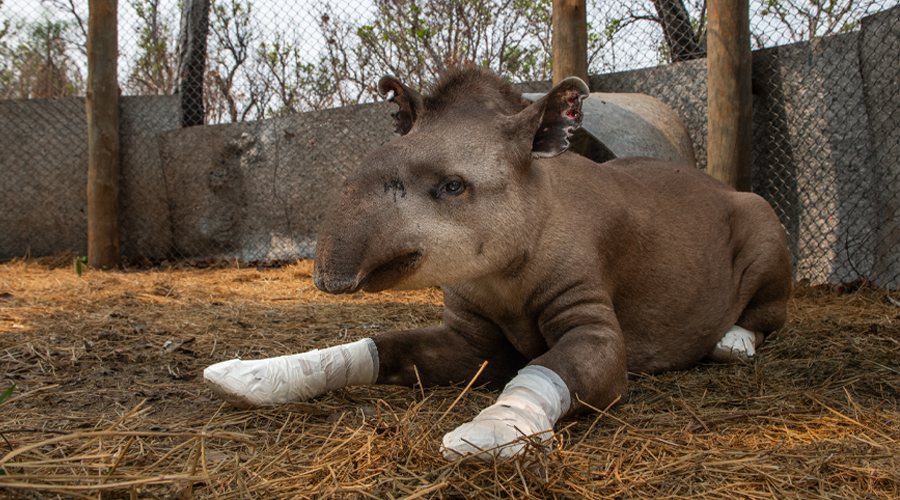
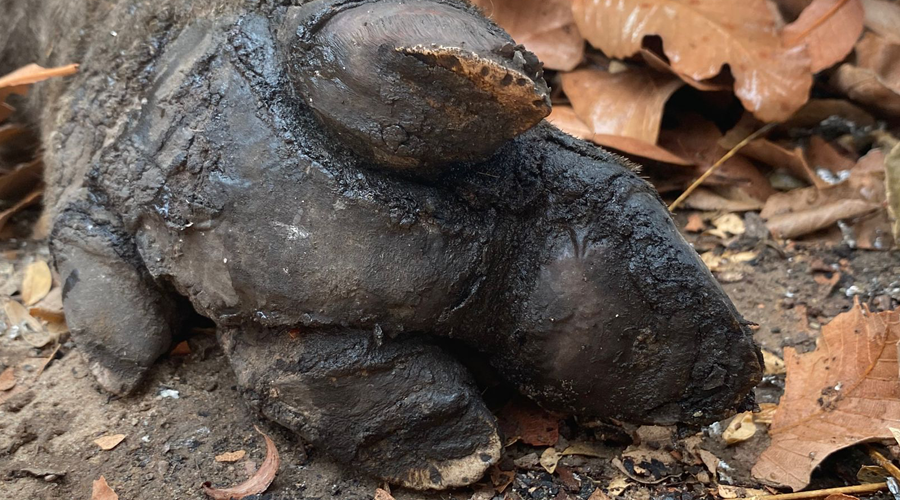
Valente was anaesthetised and taken on a 40-minute journey to a special treatment facility at the Refúgio Ecológico Caiman. An examination revealed that his feet were badly burned and that he would have to be regularly anaesthetised to treat them. But the true extent of the burns became frighteningly apparent in a couple of weeks. As the dead skin peeled away, it was clear that the burns had destroyed skin and muscle – right down to the bone.
Caring for Valente
Under Rick's guidance, the Onçafari team, with funding from World Animal Protection and other partners, embarked on a complex and highly effective treatment plan.
"Because the burns were so serious we had to anaesthetise Valente periodically so we could do what was needed. We had to clean the burns more intensively and use healing ointments. Laser and ozone therapy were important to the treatment too," says Rick.
By the end of the year, the team were very pleased with Valente's progress and looking forward to his anticipated release in the first part of 2025.
"When he is ready, we'll release him into the exact same place he was rescued. He will already have pre-established territory there, and contact with other tapirs – members of his family," says Rick.
World Animal Protection support also helped fund the treatment of Melancia a burned baby tapir who was found abandoned. She too is recovering and being prepared for a wild return when she is healthy and old enough.
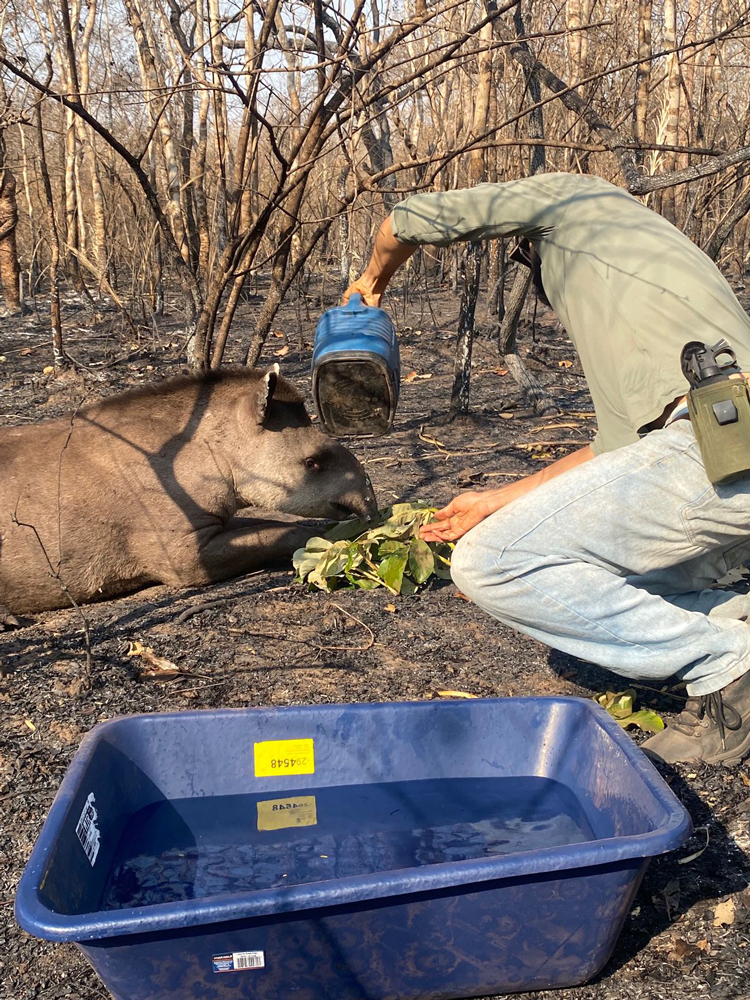

Stop Financing Cruelty
Behind every investment in factory farming is an investment in suffering. We're exposing how major financial institutions are fuelling cruelty and demanding they fund a kinder, more sustainable future.
We secured a major breakthrough when ABP, one of the world's largest pension funds, agreed to shift its investments away from industrial meat giants like JBS, setting a powerful precedent for the entire finance sector. Our report, 'ABP: Investing in an uninhabitable world' exposed how they invested over US$8 billion into companies involved in factory farming. This mobilised over 14,000 people, since 2022, to send SMS messages demanding they stop these investments. ABP has already divested from Tyson Foods, and we will follow up to ensure they stop investing in JBS.
We also celebrated the Asian Development Bank's decision to integrate animal welfare standards into their policies. Since 2019, they have invested around US$10 billion into agriculture, with a significant proportion going to factory farming. Thanks to years of pressure, they now have updated animal welfare safeguards and will no longer fund high-risk factory farming, sparing millions of animals from cruel confinement and routine antibiotic misuse.
Sadly, not all institutions are changing. Rabobank, the Netherland's second biggest bank, has invested €23.5 billion in the animal protein industry since 2016. Our report, 'Blocking a Better World Together', exposed their shocking catalogue of greenwashing and support for destructive companies like JBS and Tyson. On the day of the bank's stockholders meeting, we set up moving billboards outside their headquarters and gave out information to stockholders and employees on the banks' investments into large scale animal suffering and deforestation.
By the end of the year, over 26,000 people had signed a petition calling on the bank to change their ways. We will continue this pressure until Rabobank drops companies like JBS who put profit before sustainability.

UK Taxes: Global Harm
We exposed a disturbing truth about the misuse of public funds with our report 'Your taxes, their farms; Funding factory farming abroad'.
We revealed how over £116 million of UK taxpayer money has been channelled into cruel, industrial farming via global development banks like the International Finance Corporation.
Between 2018-2023, UK-held shares supported 1,885 projects, many driving animal suffering, deforestation, and climate destruction. Our investigation gained national headlines in The Independent, putting pressure on the government to stop financing cruelty with taxpayers money.
The UK government is not only jeopardising the country’s ability to meet its climate commitments by allowing taxpayer money to fund factory farming operations abroad, but it is also allowing billions of sentient animals to suffer on a global scale.
Other achievements in our fight for farmed animals included:
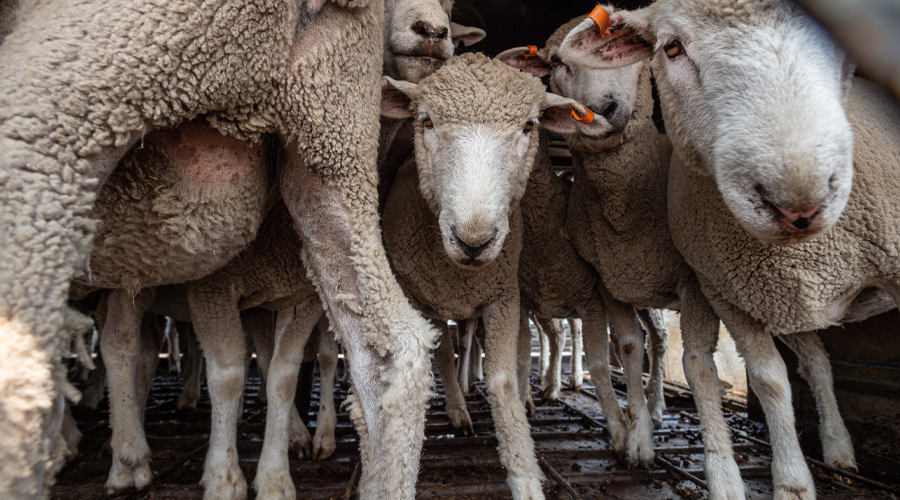
Australia ends cruel sheep exports
Celebrating the Australian government's live sheep export ban after more than a decade of campaigning by ourselves and others. The government has agreed to phase out this brutal trade by 1 May 2028, which will save millions of sheep from having to endure long, hot and overcrowded voyages of cruelty that can last up to 35 days.
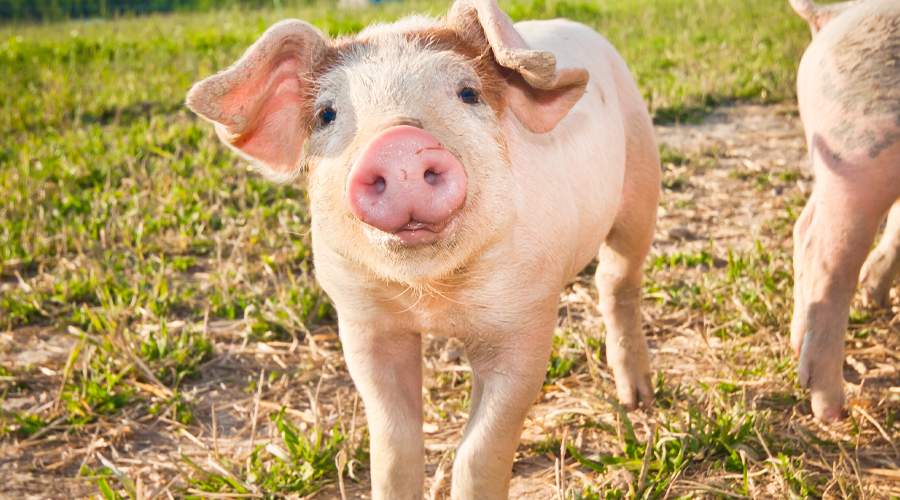
Danish MEPs back animals
Convincing 10 out of 15 Danish elected Members of the European Parliament to sign the 'Vote for Animals' pledge. We mobilised more than 10,000 people to email candidates calling on them to endorse stronger animal welfare measures in the lead up to the 2024 EU elections.
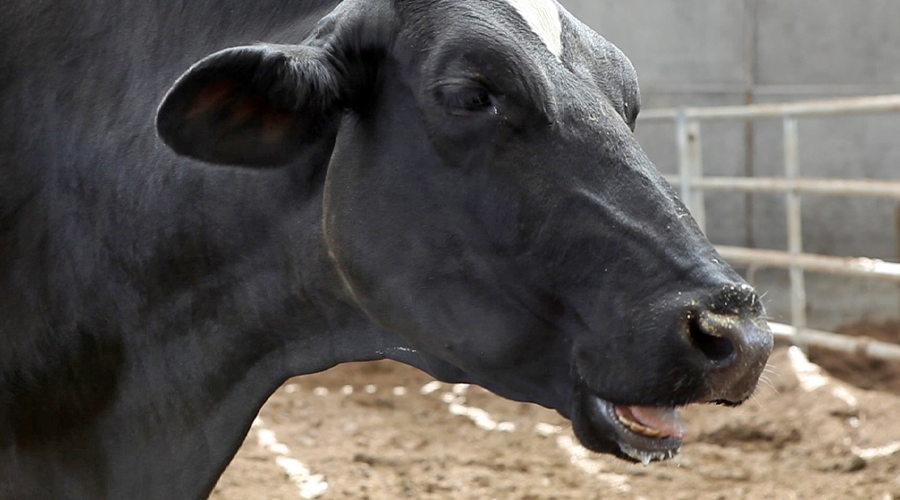
A voice for animals in Europe
Campaigning to give animals a stronger voice in Europe through our support of 'EU for Animals'. This successful campaign mobilised nearly 310,000 people and 200 Members of European Parliament over the past 5 year term to call for an EU Commissioner to have animal welfare in their title. In September 2024, the title change to European Commissioner for Health and Animal Welfare, was announced.
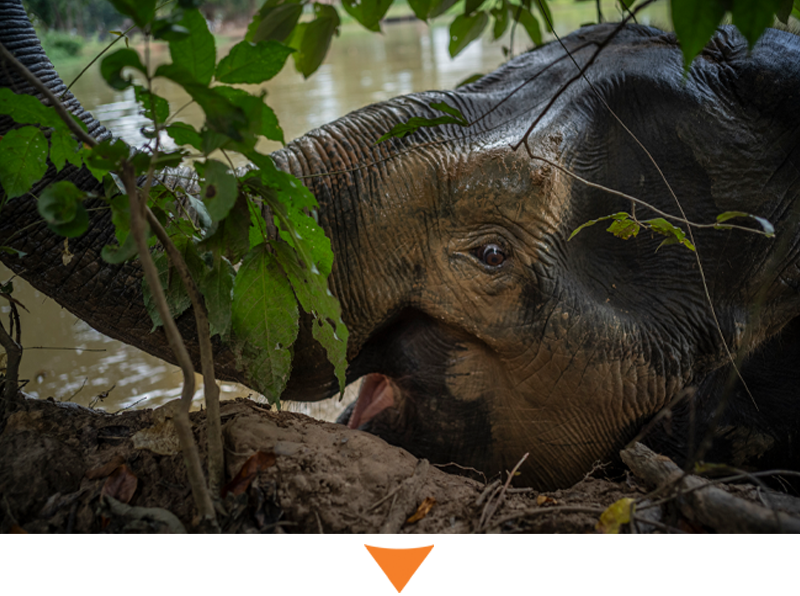
Transforming the world for wildlife
Trillions of wild animals are exploited in the lucrative global wildlife trade every year, subjected to horrific cruelty for entertainment, medicine and products.
We will transform the systems that fuel this never–ending exploitation. With your help, we will end the cruel cycle of abuse and ensure all wild animals have the right to a wild life. Forever.

Stop Selling Suffering
Across the world, thousands of wild animals are held captive in horrendous conditions, forced to perform, all in the name of entertainment. And some of the biggest names in travel are profiting from this suffering. We’re changing that.
In 2024, we secured major wins for wild animals by turning the spotlight on some of the travel industry's biggest names.
We convinced Jet2holidays, one of the UK's largest holiday providers, to drop all dolphin and captive cetacean entertainment from its offerings. We also worked closely with easyJet holidays to ensure they made their long-standing commitment to animal welfare public — clearly stating they would not promote entertainment involving captive wild animals.
These announcements achieved widespread media coverage and left TUI Group increasingly isolated. One of the largest travel companies in the world, TUI continues to sell tickets to at least 25 dolphin venues, where over 400 dolphins suffer in barren tanks, enduring harsh training regimes, and a lifetime of captivity, all to entertain tourists.
Our global campaign, supported by 15 animal protection organisations across nine countries, secured the support of 341 travel agents. More than 350,000 people signed our petition, which we delivered to TUI's headquarters. We held high-impact public stunts outside TUI's flagship store and Berlin office, engaging with employees and the public on the realities of dolphin captivity. These actions generated significant media coverage and mobilised a further 17,000 UK-based supporters to pledge a boycott of TUI until they end partnerships with dolphin venues.
Dolphin shows involve incredibly intelligent animals doing circus-style tricks and then going straight to the trainer to get a fish as a reward. And the visitors don't necessarily realise that in the wild dolphins would be swimming in a territory of around 100km², free to explore, hunt their own food and socialise with their pod. In captivity a dolphin cannot display its natural behaviours and is really just a shell of itself.
Based on the disastrous animal welfare impacts, and absolute brutality involved in these hunts, it is completely indefensible for global travel companies to continue sending unsuspecting travellers to venues who have sourced dolphins from Taiji. This is corporate irresponsibility at its worst.
We also targeted GetYourGuide, a Berlin-based travel platform offering more than 60,000 travel experiences in 150 countries, including cruel wildlife attractions like the notorious Miami Seaquarium and elephant riding venues posing as sanctuaries in Thailand.
Despite claiming to remove unethical listings, the company has no policies around protecting captive wild animals. We exposed their lies at the Skift Global Forum in New York City, where the travel industry's top CEOs and leaders, including GetYourGuide's co-founder Tao Tao, gather to discuss the future of travel. We used posters, flyers, and a 1.5-metre-tall captive elephant collage to urge hundreds of attendees to ask Tao Tao to stop supporting wildlife cruelty.
The message was loud and clear: this industry can no longer ignore animal suffering.
The report, 'Waves of Profit', revealed that GetYourGuide is one of the six travel companies selling tickets to 107 dolphin venues directly linked to the brutal Taiji hunts in Japan, where dolphins are slaughtered or captured alive and sold to entertainment venues. Following the report's release, produced with our partner Action for Dolphins, Klook and TripAdvisor both stated they would remove offerings linked to the Taiji dolphin hunt, a big step forward in cutting the commercial ties between this cruel six-month event and the tourism industry.

Wildlife Friendly Tourism
In its first full year, our Wildlife Heritage Areas programme is already making a global mark. We helped secure 11 designated sites with 7 more on the way, spanning 13 countries across every continent except Antarctica.
Together, these special places cover a vast 31,350 km² and help protect iconic and rare species — from gorillas and orangutans to Asian elephants, cetaceans, and even the elusive Nancy Ma's night monkey.
The programme was developed with our partner World Cetacean Alliance and builds on the success of their Whale Heritage Sites. It brings together conservation groups, ethical travel companies, local experts and communities to develop responsible tourism as a tool to protect precious wildlife and habitats.
To earn Wildlife Heritage status, sites must meet rigorous standards in animal welfare, conservation, sustainability, and community wellbeing. This is not just about protection, it’s about building a better future where wildlife thrives and communities benefit.
Collectively, nearly 12 million people visit these places each year, proving that wildlife-friendly tourism can work for both people and planet.
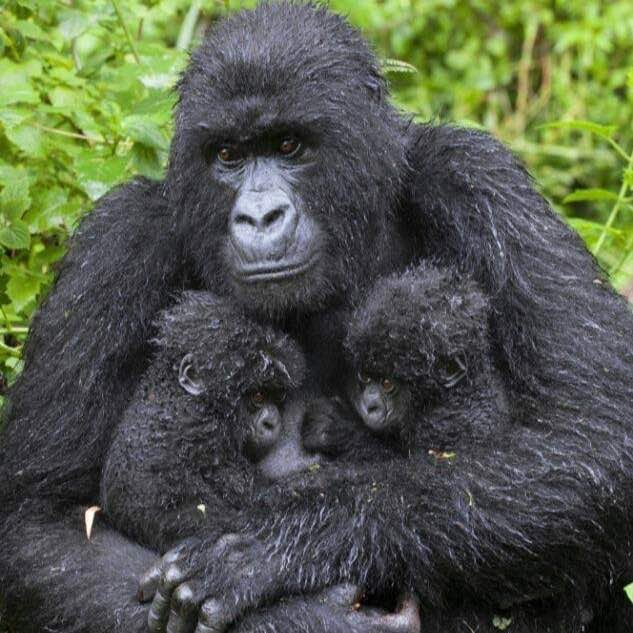
Other key achievements included:
Celebrating the end of koala cuddle experiences at Lone Pine Sanctuary, a high profile tourist venue in Queensland, Australia. The venue announced the ban in July, citing falling customer demand. Over 100 koalas will now be spared the stress of constant handling, marking a powerful shift towards more ethical wildlife tourism. The decision followed persistent campaigning from us and our supporters, and comes after our 2022 report, 'Too Close for Comfort', exposed the cruelty behind forced human-wildlife encounters.
Welcoming Dreamworld's decision to end human-tiger interactions at its Tiger Island attraction, also in Queensland; a change we've long pushed for. Nine tigers were being used for tourist shows, including being bottle-fed by handlers. In September, a handler was attacked during one such show. The practice was dropped by December. We're now calling on Dreamworld to go further and ban koala cuddling and any other human-wild animal interactions it offers.
Achieving a landmark milestone in the campaign to end dolphin cruelty with an official eviction order served to the notorious Miami Seaquarium. We've been campaigning for its closure since 2019, exposing deaths, neglect and cruelty inflicted on captive dolphins and other marine life kept there. The eviction was issued in March, yet despite legal orders and public outrage, the park was still open at the end of 2024. We will continue to demand the eviction order be upheld and the animals be urgently relocated.
Praising the 179 travel companies who had signed our wildlife-friendly travel pledge by the end of 2024. These businesses have committed not to offer experiences that exploit wild animals for entertainment, showing that powerful, consistent, evidence-based advocacy can have lasting results.

Bred for Profit: The global truths of wildlife farming
Across the world, wild animals are being bred, farmed, and exploited for profit, enduring extreme suffering so companies can cash in. In 2024, we took bold action to confront one of the biggest, most hidden threats to wildlife: commercial wildlife farming.
In March, we launched 'Bred for Profit: The global truths of wildlife farming'. This investigative report exposed the multi-million-dollar industry keeping an estimated 5.5 billion wild animals trapped in cruel, unregulated conditions on wildlife farms around the world. We revealed the brutal reality of lion farms in South Africa, elephant camps in Thailand, and bear farms in China. Here, animals are confined in cramped, unhygienic conditions, often malnourished, stressed, and ill or injured, all in the name of profit.
We exposed shocking lapses in transparency and monitoring, the spread of zoonotic diseases, and the dangerous laundering of wild-caught animals through so-called "legal" farms. Our evidence sparked media headlines, public outrage, and pressure on decision-makers.
In Uganda, we stopped a US$2.6 million captive lion breeding project, proposed by the Uganda Wildlife Education Centre. The project would have bred lions in captivity to 'boost' wild populations, despite all evidence showing such schemes fail animals and put ecosystems and communities at risk. We presented hard facts around the conditions lions are kept in and subsequent malnourishment, disease and stress; the risks posed to people when wild animals are kept in high density, poor hygiene, and in close contact with people; and the link to the illegal laundering of wild-caught animals through such farms. The government listened, and rejected the proposal.
After years of relentless campaigning with our partners, Blood Lions and the Lion Coalition in South Africa, we celebrated a major win. The South African Cabinet officially adopted a policy to end the captive breeding and commercial exploitation of lions. We provided evidence on the horrendous animal welfare problems endured by more than 8,000 lions kept on farms across the country. Their suffering includes starvation, cannibalism and disease. This landmark decision marks a critical turning point.
Whether it be for the pet industry, entertainment, traditional medicine, decoration, or fashion – cruel wildlife farming must end now. Governments, the private sector, and us as consumers must prioritise efforts to ensure that wildlife is protected in their natural habitats. This must be the last generation of wild animals farmed for profit.

Healing Without Harm
In China, we are inspiring a powerful shift away from cruelly produced wildlife-based traditional medicine, helping protect thousands of wild animals from exploitation.
In 2024, we moved 48,802 consumers, 1,597 doctors, and three major pharmaceutical and healthcare companies, to commit to using wildlife-friendly alternatives.
Since 2019, 6,350 clinicians have pledged not to prescribe or recommend medicines or supplements containing wildlife ingredients. These medicines often use parts of threatened species like tigers, pangolins, rhinos, seahorses, and turtles.
We introduced our Wildlife-friendly Medicine Network at the prestigious 2024 Health China Healthcare Industry Conference in Shenyang. This influential platform was set up with Guangzhou Hanfang Pharmaceutical Company, Yun TCM and Chunyu Doctor, one of China’s largest online medical service providers. It encourages collaboration among pharmaceutical companies, industry associations, research institutions, doctors, and experts to explore humane, wildlife-friendly alternatives.
New members to our growing alliance included Wujiang Culture, a leading health and wellness business and lifestyle brand, and Orange One, a digital healthcare service.
We are also working to advance policy reforms in China to end the use of wildlife in traditional medicine. We successfully submitted a proposal to the National People's Congress, supported by two Congress members. In response, the National Medical Products Administration reaffirmed its commitment to developing wildlife-free alternatives and introduced new technical guidelines that support this. These reforms mark a major step forward in ending wildlife farming for medicine.

Removing Wildlife from the Catwalks
We pushed the fashion world further from cruelty in 2024, securing major wins with leading Fashion Weeks banning wild animal body parts from the catwalk.
Working with our partner, Collective Fashion Justice, we moved Copenhagen Fashion Week to ban crocodile and snake skins, and ostrich feathers, from its 2025 shows, following its 2023 fur ban. Berlin Fashion Week also adopted a wildlife-free policy, and Melbourne Fashion Festival banned wild animal feathers entirely.
In November, the British Fashion Council extended its fur ban to include all wild animal skins at London Fashion Week events. Brands must now be both fur and skin free to appear on the official schedule. We will keep pushing for them to ban feathers too as most come from ostriches farmed in South Africa where there is very little protection for their welfare.
Step by step, we’re making ethical fashion the standard.
We are really pleased that the British Fashion Council has extended its ban on fur to include wild animal skins. This is a significant milestone, one which will hopefully set an important example for other international fashion weeks. Exploiting animals for their skins is unethical and unnecessary.
Millions of animals continue to suffer and die for fashion when there are so many innovative and exciting animal-friendly materials designers and clothing companies can choose to create with instead. We congratulate the British Fashion Council on their positive action for animals and look forward to continuing our work with them to secure similar protections for wild birds exploited for their feathers.

Transforming Thailand’s Elephant Tourism
We delivered a powerful message to the Thai government with over 172,000 people from 26 countries, demanding an end to the cruel breeding and exploitation of captive elephants.
These petition signatories fuelled our urgent call to pass the long-delayed Elephant Protection Bill, legislation we helped draft alongside politicians, legal experts, other NGOs, academics, and the Thai public. The goal is to end captive elephant breeding for commercial purposes.
Every year, thousands of elephants suffer in venues that force them to give rides, perform out-dated circus tricks, and endure brutal training, all in the name of entertainment. In 2020 alone, 2,798 elephants were being used across 246 camps, the vast majority kept in inhumane conditions, enduring injuries from saddles and chains, foot problems from walking for long periods on hard ground, and poor veterinary care.
While political instability and natural disasters have delayed the bill, our commitment has never wavered. In 2025, we'll rebuild government alliances, push harder for a breeding ban, and continue driving change in the tourism industry.
Since 2018, we have been supporting venues to adopt our elephant welfare standards and become ethical alternatives for tourists. In 2019, we partnered with Following Giants, an elephant camp in Koh Lanta, to transform into a sustainable, elephant-friendly venue. That transformation was recognised when they received a prestigious Tripadvisor 2024 Travellers' Choice Award.
We launched an exciting new project with Sappraiwan Elephant Sanctuary, to give six elephants better lives. We are helping improve the venue's facilities, its promotion, and increase staff numbers. We are committed to revolutionising elephant tourism in Thailand, and Sappraiwan joins nine other venues we've helped transform, so elephants can live a more natural life, chain-free.
I am thrilled at the prospect of adding Sappraiwan Elephant Sanctuary to the growing list of high welfare venues that will help transform elephant tourism in Thailand. These beautiful elephants will have a haven to thrive in, after so many years of suffering in their past.

From Cruelty to Care: A Better Life for Bears
Thanks to the dedication of our generous supporters, we have helped give over 190 rescued bears a second chance at life, far from the cruelty of entertainment and exploitation they suffered in the past.
In Romania, we have proudly supported Asociația Milioane de Prieteni (AMP) since 2012. By the end of 2024, 123 bears were living at the beautiful Libearty sanctuary, near Zarnesti in the Carpathian Mountains. AMP's commitment to becoming financially self sufficient is a step closer. In 2024, they were 88% self-sufficient, exceeding their target by 10%. This incredible achievement means they are less reliant on our funding, and have greater long-term security for the bears. 36,991 people visited the sanctuary, a powerful reminder that ethical tourism can fund protection, not exploitation.
In Pakistan, we continued supporting the Balkasar Bear Sanctuary, run by our long-term partner, Bioresource Research Centre (BRC). Here, 68 bears, once forced into brutal baiting and dancing, now receive expert, compassionate care.
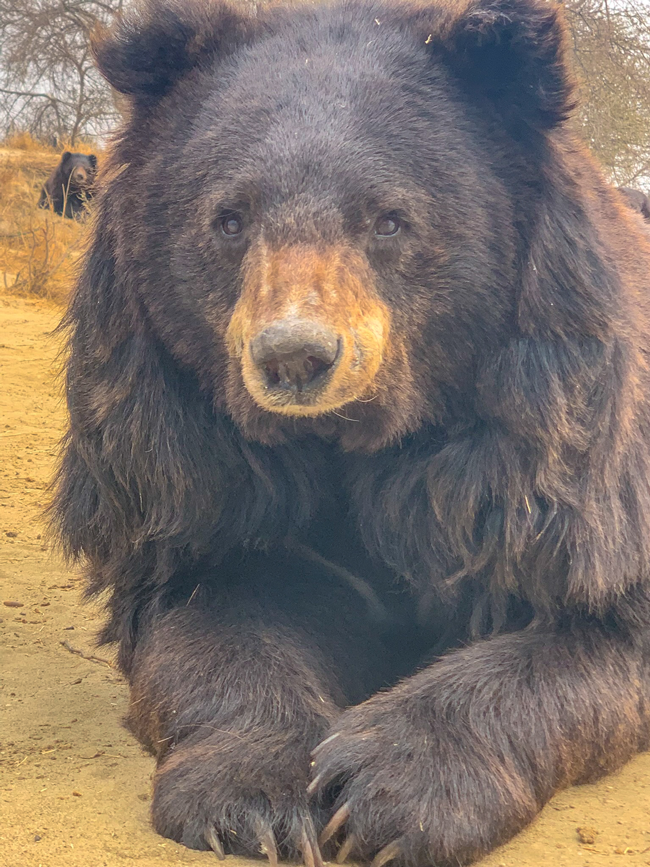
Since 1997, we've worked alongside BRC and wildlife authorities to eliminate bear entertainment in Pakistan, helping former bear owners transition to alternative livelihoods. The number of bears still in private ownership has dropped to just 25-35, down from 85 in 2021, another major step toward ending this cruel practice for good.
Unlike in Romania, Balkasar cannot develop alternative income streams, so our financial support remains vital. In 2024, we funded key improvements including tiling all 27 quarantine enclosures, kitchens, and food prep areas to improve hygiene and cooler temperatures; planting brassica in fields – a rich source of oils and nutrients for bears; and installing sprinklers and mobile water showers to help the bears stay cool through extreme heatwaves.
Whether it's a forest in the Carpathians or the dry plains of Punjab, these sanctuaries are symbols of what compassion, persistence, and global support can achieve. Together, we are rewriting the story for bears.

A new life for Chinh with FOUR PAWS
A bear farmed for his bile and forced to live alone in a tiny 1.5m x 1.5m steel cage for 20 years in Vietnam was finally released to safety in May after his owner was persuaded to surrender him.
Chinh, an Asiatic black bear – or moon bear – was rescued by FOUR PAWS, with our support and that of the Vietnam Forest Protection Department (FPD). After the rescue he was taken to the FOUR PAWS bear sanctuary in Ninh Binh for specialist care. The sanctuary is a semi-wild location, allowing the resident bears a wide-open space of 5.5 hectares to roam and play freely, and designed with enrichments to stimulate the bears' natural behaviours.
Chinh's rescue is part of a long-term World Animal Protection and FPD project which has been microchipping and monitoring bears on bear bile farms across Vietnam since 2006. Bears found without a microchip and/or registration papers are deemed illegal and confiscated.
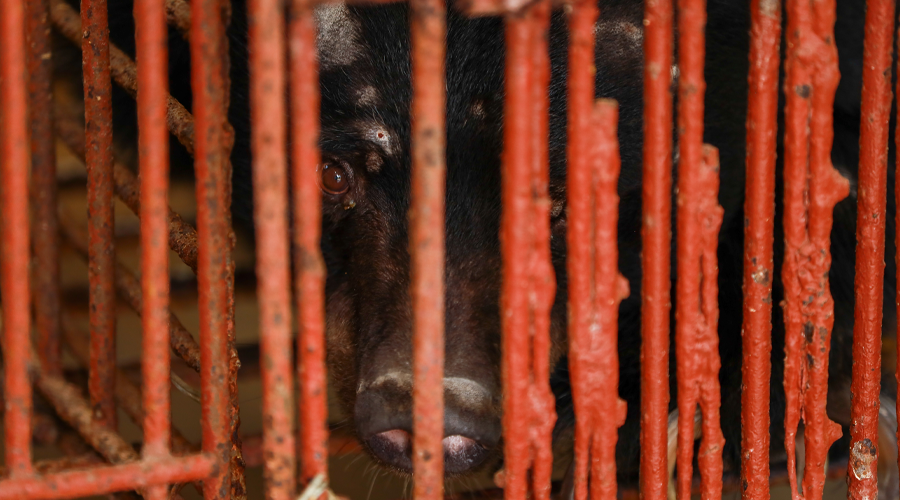
This ensures no new bears from the wild or other sources enter captivity for the bile industry, where bear bile is used in traditional Asian medicine. The project also works to persuade bear owners to voluntarily surrender their animals to sanctuaries.
Chinh was the fifteenth and final bear to be rescued from this particular farm. The bear bile industry has been illegal in Vietnam since 2005. However, a legal loophole allows bears like Chinh to be kept as 'pets' meaning that some 200 bears in the country still suffer a tortuous life in captivity. This situation has provided cover for illegal bile extraction in Vietnam.
Bear bile is used in traditional Asian medicine and is believed to treat abscesses, haemorrhoids, epilepsy and cysts. The suffering is wholly unjustified as herbal and synthetic alternatives are all readily available.
For almost 20 years, we, alongside other NGOs, have worked with the Vietnamese government to end the cruel practice of bear bile farming. Collective efforts have resulted in a 95% reduction in the number of bile bears in Vietnam, from 4,300 bears recorded in 2005 to 200 bears on farms today.
We continue to work with the authorities, our local partner Education for Nature Vietnam, and other NGOs, to identify and confiscate illegal bears or convince bear owners to voluntarily surrender them. Our aim is to ensure the Vietnam Government closes all bear farms and transfers any remaining animals to sanctuaries and rescues centres by the end of 2025.
This must be last generation of bears to suffer a life in captivity.
The exploitation of captive bears for their bile is one of the worst examples of animal cruelty in the world today. Each and every bear freed from small, barren cages is a massive win…
The Vietnamese government must close all remaining legal loopholes to end the suffering of bile bears for good. We must ensure this is the last generation of bears to suffer in appalling captive conditions. Chinh deserves the rehabilitation on offer at FOUR PAWS sanctuary in Ninh Binh, and a life of greater dignity.

Monkeys' Last Dance
Our partners at Jakarta Animal Aid Network (JAAN) successfully rescued a troupe of 31 macaque monkeys from Indonesia’s last remaining ‘monkey dance training village’, making a significant leap in our joint mission to end the brutal ‘Dancing Monkeys’ trade for good.
These long-tailed macaques were stolen from the wild as infants and subjected to a cruel training regime designed to make them perform for tourists on busy streets. They endured starvation, physical abuse, and confinement in tiny cages or dark boxes when not performing. They were often chained by their necks, dressed in masks and doll outfits, and made to stand on two legs for hours on end, with the constant threat of choking.
Because of this trauma, the monkeys have a long road to recovery ahead, but we are hopeful they will be able to be released back into the wild. They are now safely at a rehabilitation centre in Cikole, West Java, where they are under expert care to help them heal from their physical and psychological wounds. Their rescue not only marks the end of the suffering of these monkeys, but also brings Indonesia closer to a future free from this barbaric practice as this effectively closed the last dancing monkey training village in the country.
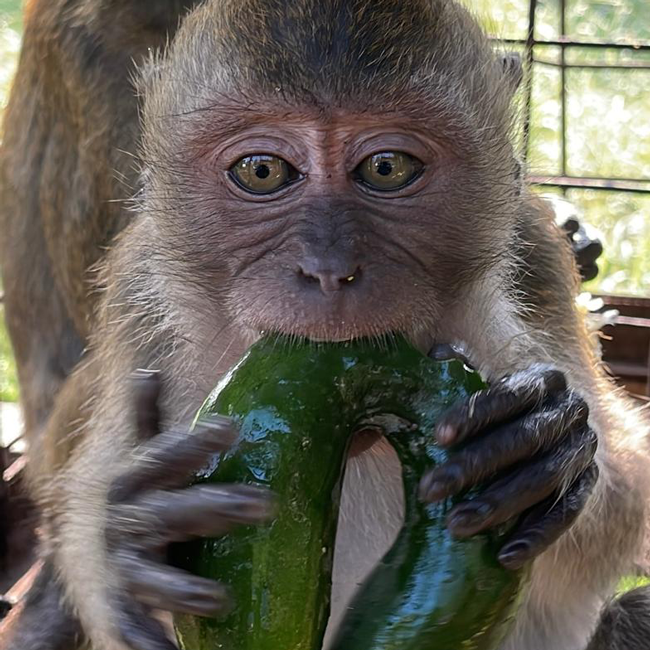
These monkeys have endured one of the cruellest training regimes imaginable. After being stolen from their mothers as babies and tortured for months, their living nightmare is finally over.
Now we are one step closer to ending these horrific dancing monkey practices in Indonesia for good. We look forward to the day when we can celebrate a nationwide ban on dancing monkeys.
More progress to end wildlife exploitation:
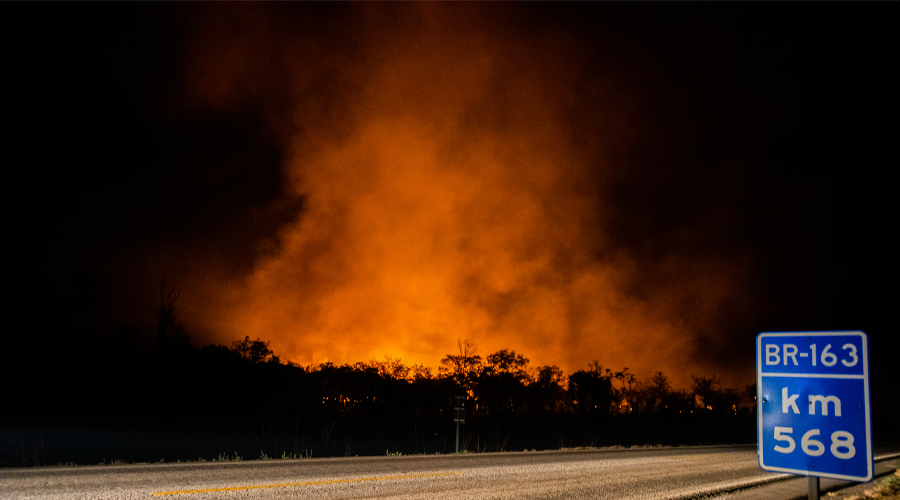
Milestone in fight for forests
Released our 'Fauna legal framework' with Brazil's Ministry of Environment. This powerful new tool is a milestone in our fight to stop habitat destruction by agribusiness, and improve wildlife protection. Already recognised as a key reference, it will help push solutions to restore native forests and promote eco-tourism.
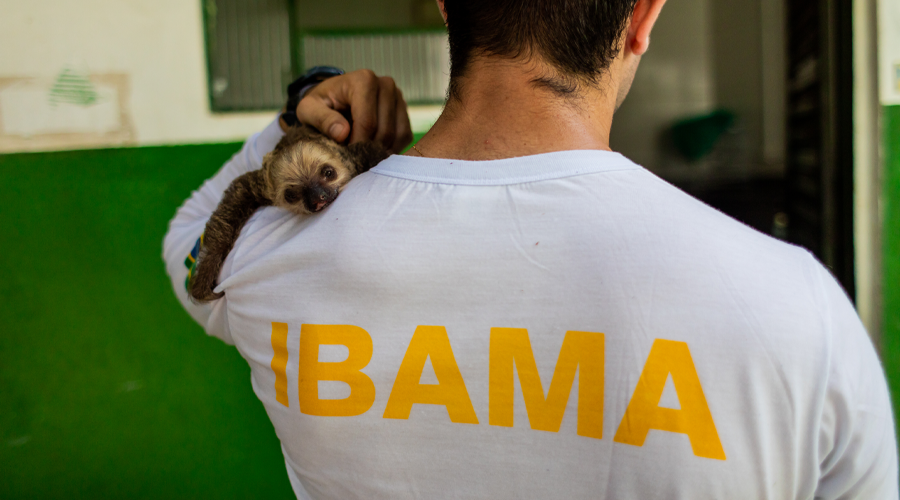
Lifeline for Brazil's Rescued Wildlife
Signing a 10-year agreement with IBAMA to renovate the Wild Animal Screening Centre (CETAS) in Pará. This vital facility will be a lifeline for animals rescued from trafficking, fires, road accidents, and abuse in one of Brazil's most critical deforestation hotspots. It will help identify, treat, and rehabilitate wild animals so they can return to the wild where they belong.
How we’ll move the world in 2025
Goal 1: Ensure farmed animals live good lives by transforming the global food system
Target major corporate customers of JBS like McDonald’s. We will highlight the reputational and business risks of factory farming, while pushing for stricter international regulations and environmental standards. We will move consumers towards plant-based alternatives, reduce the expansion of factory farms, and promote sustainable farming practices.
Take full advantage of COP30 in Brazil to push for recognition that an equitable, humane, and sustainable food system is vital to achieving the Paris Agreement. Together with civil society and governments, we will champion agroecology, high-welfare farming, and a global shift to halving animal protein consumption by 2040. Our Just Transition white paper and roadmap will give investors and policymakers the tools they need to act, making it clear that factory farming has no place in a sustainable future, and paving the way towards real, lasting, food system change.
Disrupt the funding for factory farms, by ensuring investors, banks, and credit rating agencies fully understand the damage it does to billions of animals, our own health, and our planet. We will use our ‘Big meat exit list’ to push for the defunding of JBS and the move towards equitable, humane, and sustainable investments.
Goal 2: Stop wild animals being cruelly exploited as commodities by changing the systems that allow it
Move TUI Group and Klook to end the sale and promotion of cruel wildlife entertainment by the end of 2025. We will galvanise people-power, maximise media coverage, and link up with other allied animal welfare organisations. We will highlight the reputational risks supporting these venues poses and drive consumer demand for wildlife-friendly tourism. We will ensure captive wildlife entertainment will no longer be the industry norm.
Encourage our corporate partners and allies, already committed to wildlife-friendly travel, to promote sustainable tourism practices. We will highlight elephant-friendly venues in key tourist destinations, using these successes to inspire industry leaders and catalyse a broader shift toward ethical practices.
Ensure that our organisation effectively gathers impactful stories of animal suffering in the entertainment industry and inspiring examples of wildlife-friendly tourist venues that have changed animal’s lives for the better. We will use these stories to make our calls to action powerful and compelling, mobilise our supporters, and put pressure on our targets.
I am honoured and excited to partner with World Animal Protection as a global ambassador. Animals have always held a special place in my life, and I want to help create a world where they live free from suffering.
Working to support World Animal Protection means we can make meaningful changes and progress needed to ending animal cruelty and suffering.
Evanna Lynch, World Animal Protection ambassador,
actress and writer
